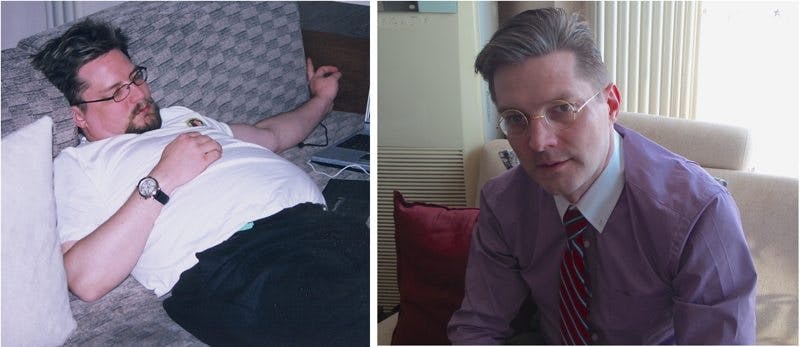“I was constantly fatigued and eating”

Before and after
I received an email with Paul’s story about how he was tired and overweight. Here’s what happened when he found LCHF:
The Email
Andreas,
I started with LCHF on April 4 of 2012, so it’s been 2 years and 10 days. What can I say, besides I had a huge stomach and a difficult time going up flights of stairs. I had serious gout attacks, high blood pressure, high cholesterol and skyrocketing triglycerides. I was constantly fatigued and eating.
I went to a physician and was given 7 different kinds of medicine to take. Of course, I instinctively knew that taking meds wasn’t going to cure me; I knew I needed to change what I was eating- but I didn’t know what to eat. I didn’t want to weigh food, count calories; play that game. So, I started researching and found “The Food Evolution” online as well as “The Bitter Truth”, Dr. Lustig. It became absolutely clear to me that carbs were the problem.
I planned one day; eggs, cream, bacon, cheese, salads, steak… I wasn’t hungry. I got more help with meals from Maria Emmerich. I went from a size 40 pant down to a 32. My younger look returned to me. Whenever I consider going back to carbs I take a 2-second look in the mirror and grab a slice of bacon… No pills, my cholesterol/triglycerides went down, blood pressure is great; my entire body corrected itself. More energy, more clarity in my thinking, my skin is perfect – no acne or pimples ever. Others that watched me lose also went on LCHF with the same results.
Comment
Congratulations on your health and weight improvements! Great that others were inspired by your results!
More
More health and weight stories
More on the metabolic syndrome
Share your story
Do you have a success story you want to share? Send your information, plus before and after photos, to success@dietdoctor.com. It would also be greatly appreciated if you shared what you eat in a typical day, whether you fast etc. More information:
Share your story!